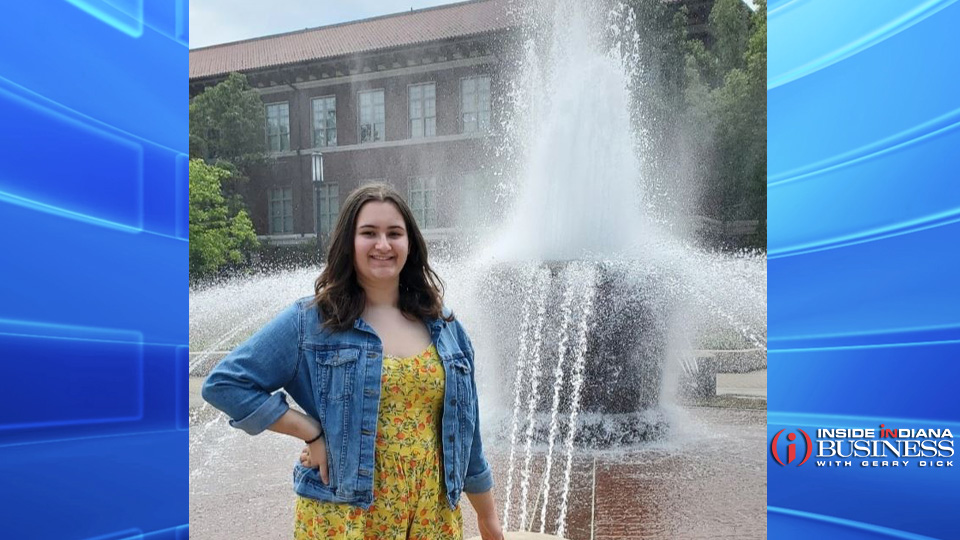Lilly $42M to pay full tuition for hundreds of disadvantaged PU students
Subscriber Benefit
As a subscriber you can listen to articles at work, in the car, or while you work out. Subscribe Now
When Purdue University student Giulia Episcopo was first told about Indianapolis-based Eli Lilly and Co. providing $42.5 million for a pharmaceutical manufacturing scholarship program—dedicated to underrepresented students—she called home to share her joy. As the daughter of an immigrant and raised in a rural community dominated by blue collar jobs, she understands the significance of opening doors for students like her. Lilly is giving Purdue an additional $50 million to expand a collaborative research effort at the university, adding up to a $92.5 million boost for new medicines and future scientists.
Episcopo grew up in Hampshire, Ill., a small rural community about 60 miles northwest of Chicago with a population of only 6,000. Her father immigrated from Italy when he was 21 years old, and her maternal grandparents immigrated from Puerto Rico. Her father’s family still lives in Italy, so she’s most familiar with Hispanic culture.
“It wasn’t easy for them to make money and try to move up the socioeconomic ladder; it was a lot of hard work and long working hours,” says Episcopo, a sophomore studying chemical engineering. “That takes a toll.”
Her mother is a college graduate and elementary school teacher, and her father manages a local grocery store, so Episcopo is the first in her family to pursue a STEM-focused career—and it felt to her like she was also the first in her community.
“The environment [in Hampshire] isn’t really cultivated to produce STEM majors; it was hard in high school, for sure,” says Episcopo. “My family didn’t really know what it was like to be an engineer and have an education in that area—the amount of work it would take and the path to get there. Purdue broke a lot of those barriers I was facing being in a rural community and having an underrepresented background.”
While Episcopo doesn’t qualify to be a Lilly Scholar because the first scholarships will be given to incoming students beginning next fall, she’s elated that the program will give students like her a more attainable path to Purdue. The scholarships will provide full tuition for 75 to 100 students each year over the course of a decade, and each student will have a guaranteed internship or co-op at Lilly, planned interaction with company leaders and preferred access to compete for employment at Lilly after graduation.
A key priority for the program is awarding the scholarships to incoming students who have overcome socioeconomic or educational disadvantages, are first-generation college students or are generally underrepresented at Purdue. Episcopo says she was “in shock” when she considered the size of the Lilly Scholar program and the impact it would have for other underrepresented students.
“Not only does is break down that financial barrier, it goes the extra mile by providing the internship and mentorship component. That’s really what stood out to me,” says Episcopo. “Coming from a background where I had to dig really deep for mentors, it’s really invaluable for underrepresented Purdue engineers to have a mentor to foster that learning environment.”
The remaining $50 million of Lilly’s commitment will expand a research collaboration with Purdue that began in 2017 and focused on drug delivery; the initial commitment was also $50 million. The new “master agreement” will extend the work for another five years, focusing on research in genetic medicine, intrathecal delivery (a pump that delivers medication directly to the spinal cord) and nanoparticle drug delivery.
Lilly currently employs nearly 2,500 Purdue graduates—higher than any other university. Purdue says the Lilly Scholars program will better position the university “to recruit the best, brightest and most diverse students we can.”
Episcopo has some financial support from a different Purdue program, which she says helps “take the financial weight off my mind.” Beyond campus, she’s encouraged that “a huge company also recognizes the need for diversity and wants to cultivate that.”
“For other underrepresented students, it shows that people are thinking of them,” says Episcopo. “People are doing things to give them more opportunities and make it a little less overwhelming to be able to find success in a discipline that may not seem the most attainable because of the current disproportion of minorities. And that’s very encouraging.”
Episcopo says Purdue “has done a really good job of putting me on a path that will allow my passion to flourish.”
Episcopo is part of Purdue’s Minority Engineering Program, which she says has opened her eyes to why diversity is important in her profession.
